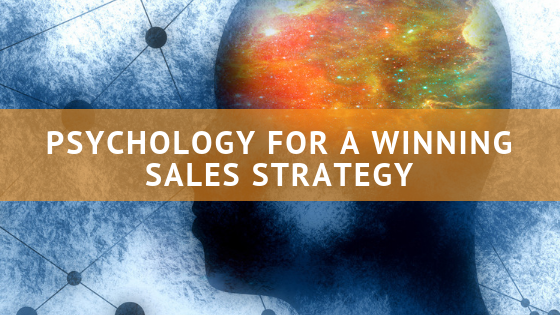When you consider ways to develop a winning sales strategy, how often do you think about sales psychology as part of the plan? Getting prospects to make a buying decision is more than just offering them a better deal or even offering the perfect solution to their problem. You have to build trust and establish the right emotional connection in order to get to “yes!” That’s why more sales professionals are paying closer attention to the psychology of selling.
There are various psychological tactics that you probably use at different stages of the selling process without even realizing it. In the past, we’ve outlined the three key components that are essential for any winning sales strategy. Let’s take a look at some of the psychological elements that help you close at each stage.
Component 1: The Psychology of the Customer Engagement Process
Contacting target customers is only the first step. You have to get them to engage. That means establishing common ground and providing an incentive for them to interact with you, seeking more information.
One of the most common psychological principles used in successful sales is reciprocity; if you give something to someone, they feel obliged to return the gesture. What you choose to offer can be almost anything: free analysis, personalized gift, free trial period, and so on. Whatever the reciprocal offer, it has to have some perceived value. Offering a free demonstration, for example, doesn’t really work because the demonstration is free anyway and for your benefit; the prospect gets little or no value. However, there are other strategies that do offer perceived value:
-
Access to valuable content in exchange for an email or an invitation to engage.
-
A free trial period of discounted introduction gives customers a bargain.
-
Donating to charity in exchange for a sale makes customers feel good.
Tapping into the psychology of commitment and consistency also can promote engagement. If you can get the product into the customers hands—try before you buy—your chances of closing the sale increase because the customer has already committed. Even the act of signing up for an online newsletter or mailing list is an act of commitment.
You can also promote consistency by showing you stand behind your product or service and offering value with extended warranties and support guarantees.
Component 2: Prioritizing Leads Who Are Ready to Buy
Anyone in sales knows that targeting your hottest leads yields better results than stirring the ocean for prospects. To identify leads that are ready to act, you need to apply the principle of unity.
The concept of unity is one of shared identity or belonging to the same group with the same values. Labeling theory can be a useful psychological tool here. Labeling is how people identify themselves. By applying labeling, you can understand how prospects see themselves as part of the sales process, e.g., whether they feel empowered, smart, insightful, innovative. You also can influence the lead by giving them labels. For example, if you tell a prospect they are insightful or an innovator then they can embrace those labels as part of a shared identity.
Another way to prioritize your leads is to label them according to their buying habits. There are three types of buyers: tightwads (24 percent of the population), average buyers (61 percent), and spendthrifts (15 percent). Naturally, spendthrifts will be the easiest to convert, but if you categorize leads, you can apply different tactics. To win over tightwads, for example, consider offering a custom bundle or a discount—an offer that implies they get something extra for no additional cost.
B2B customers also tend to be driven by the psychology behind buying cycles - ensuring they spend every penny to preserve next year’s budget, or adding new projects to expand their current budget. Many of these decisions are calendar-driven, so you will have a better opportunity to close a sale if you approach them at the end of the fiscal year, when they have to exhaust their operating budget, or when you can make a case for inclusion in next year’s budget.
Component 3: Psychology in Your Sales Process
Once you have engaged and prioritized your leads so they are ready to buy, it’s time to close. Your objective is to remove obstacles to closing the deal and make the customer comfortable, even happy, with the buying decision.
Habituation is a factor in closing. Habituation is the phenomenon where consistent exposure to a specific stimulus creates familiarity which reduces response. For example, the first time you hear a car backfire it may be jarring, but once you have identified the sound, it becomes background noise. You want to stimulate action without becoming background noise.
To help you overcome habituation, you need to embrace the psychological principles of liking and authority. Liking is a way to form a connection. You want to present a personality that the customer can relate to, and the best way to do that is to tell your story in order to provide common ground. In addition to liking, if you show expertise and demonstrate that you are an authoritative resource, perhaps with a title or certification or specific expertise, it will engender trust. Offering endorsements from other experts also establishes authority. That’s why consumer brands use celebrity endorsements and you should use customer case studies and success stories.
And if you don’t have the necessary features or can’t deliver, admit it! Acknowledging that you may not be a fit for one another is a strength in itself. It demonstrates honesty and integrity, rather than trying to shift the blame elsewhere. If you can’t deliver, be sure to recommend someone who can. The goodwill generated by solving the customer’s problem will pay off later, when they need something you can deliver.
Psychology is an important component of any winning sales strategy. If you want to get more from your sales program, why not consider engaging an experienced sales psychologist? As an outsourced sales and marketing service provider, MarketStar has been applying psychology using Sales as a Service® to build winning sales programs for our clients for more than 30 years. We can offer you that same expertise to help you generate more revenue and increase sales.







